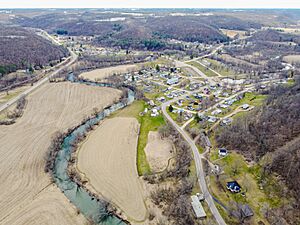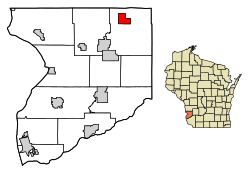Soldiers Grove, Wisconsin facts for kids
Quick facts for kids
Soldiers Grove, Wisconsin
|
|
|---|---|
|
Village
|
|

US-61/Wis-131 and the Kickapoo River go through town
|
|
| Nickname(s):
America's First Solar Village
|
|

Location of Soldiers Grove in Crawford County, Wisconsin.
|
|
| Country | |
| State | |
| County | Crawford |
| Area | |
| • Total | 3.58 sq mi (9.28 km2) |
| • Land | 3.58 sq mi (9.28 km2) |
| • Water | 0.00 sq mi (0.00 km2) |
| Elevation | 725 ft (221 m) |
| Population
(2020)
|
|
| • Total | 552 |
| • Density | 154.2/sq mi (59.48/km2) |
| Time zone | UTC-6 (Central (CST)) |
| • Summer (DST) | UTC-5 (CDT) |
| Area code(s) | 608 |
| FIPS code | 55-74550 |
| GNIS feature ID | 1574364 |
Soldiers Grove is a small village located in Crawford County, Wisconsin, in the United States. It sits right next to the Kickapoo River. In 2020, about 552 people lived there. This village is famous because it moved its main business area to higher ground. This happened after many floods from the nearby Kickapoo River in the 1970s. Soldiers Grove is now a great example of how a community can move away from danger, a process called managed retreat.
Contents
History of Soldiers Grove
Soldiers Grove was first settled in 1856 by Joseph H. Brightman. He built a sawmill there to cut logs that floated down the Kickapoo River. The village that grew around the sawmill was first called "Pine Grove." This was because there were many Eastern White Pine trees nearby. In 1867, the village's name changed to "Soldiers Grove." This new name honored the soldiers who had camped in the area during the Black Hawk War.
Fighting Floods and Moving the Village
In its early days, Soldiers Grove relied on the Kickapoo River. The river helped transport timber and provided power for mills. However, being so close to the river became a problem in the early 1900s. Major floods started to hit the village. Big floods happened in 1907, 1912, 1917, and 1935. After these floods, the people of Soldiers Grove asked the United States government for money to control the floods.
Even after another big flood in 1951, the government didn't agree to a flood control plan until 1962. They planned to build levees (walls to hold back water) and a dam on the Kickapoo River. This dam was supposed to be upstream from Soldiers Grove. But because of environmental concerns, construction of the dam stopped in 1975 and was never finished.
Meanwhile, in 1974, a new rule about floodplains (areas that flood often) took effect in Soldiers Grove. This rule stopped new buildings from being built near the river. It also made it very hard to fix old buildings. This really hurt the village's downtown area. The government offered to build a levee in 1975, but the village said no. It would have cost $3.5 million to build and $10,000 a year to keep up. The downtown property was only worth about $1 million.
Instead of building a levee, the village leaders suggested using the government money to move the business district. They wanted to move it away from the floodplain. But federal agencies kept saying no. Even so, in 1977, the village used its own money to buy land on higher ground. This was where the new business district could be built.
In 1978, the Soldiers Grove area flooded again. After this disaster, the government finally gave $900,000 to help move the village's business district. Building the new business district started in 1979 and finished by 1983. A park was created where the old downtown area used to be, along the river. Even though big floods happened again in 2007 and 2008, the village was safe because it had moved.
America's First Solar Village
When Soldiers Grove started its moving project in 1979, the United States was facing high energy costs. To deal with this, a special team suggested that the new business district should use solar heating. Even though Soldiers Grove is in Wisconsin, a northern state, studies showed that new buildings could get most of their heat from solar energy.
Because of this, the village council, led by Daniel Naccarato, made a new rule. It said that all new commercial buildings had to get at least 50% of their heat from the sun. Another rule stopped any new building from blocking sunlight to another building.
To meet these solar energy rules, buildings in the new business district were built with thick insulation. They also used earth-berming (piling earth against walls) to store heat. South-facing roofs and windows were designed to catch the most sunlight. Fans and hydronic systems (which use water to move heat) were put in to spread the collected heat. More than twenty solar-heated businesses were built in this small community. The government helped pay for moving the businesses, but no extra money was given for the solar heating part.
Besides solar heating, Soldiers Grove also made other rules for the new business district. These rules made sure buildings were easy for people with disabilities to use. They also limited advertising signs and encouraged using natural building materials.
A report in 2003 said that some of the solar-heated businesses weren't as energy-efficient anymore because of poor upkeep. But it also said that "most of the buildings are still excellent examples of solar energy at work."
Geography
Soldiers Grove is located at 43°23′45″N 90°46′20″W / 43.39583°N 90.77222°W.
According to the United States Census Bureau, the village covers an area of about 3.56 square miles (9.22 square kilometers). All of this area is land.
Population Information
The population of Soldiers Grove has changed over the years:
| Historical population | |||
|---|---|---|---|
| Census | Pop. | %± | |
| 1880 | 196 | — | |
| 1900 | 680 | — | |
| 1910 | 667 | −1.9% | |
| 1920 | 653 | −2.1% | |
| 1930 | 710 | 8.7% | |
| 1940 | 778 | 9.6% | |
| 1950 | 781 | 0.4% | |
| 1960 | 663 | −15.1% | |
| 1970 | 514 | −22.5% | |
| 1980 | 622 | 21.0% | |
| 1990 | 564 | −9.3% | |
| 2000 | 653 | 15.8% | |
| 2010 | 592 | −9.3% | |
| 2020 | 552 | −6.8% | |
| U.S. Decennial Census | |||
In 2010, there were 592 people living in the village. Most residents were White (99.5%). About 18.2% of the people were under 18 years old, and 27.7% were 65 or older. The average age in the village was 47.3 years.
Notable People from Soldiers Grove
- Beauford T. Anderson, a soldier who received the Medal of Honor
- T. Frank Clancy, a member of the Wisconsin State Assembly and village president
- James O. Davidson, a former Governor of Wisconsin
- James Dinsdale, a member of the Wisconsin State Assembly
- Agnes Moorehead, an actress famous for Bewitched, who once taught school here
- Atley Peterson, a member of the Wisconsin State Assembly
- Keith N. Schoville, a professor at the University of Wisconsin–Madison
Claim to Fame
Soldiers Grove calls itself "America's First Solar Village." It was the first community in the United States to make a rule that commercial buildings had to use solar heating.
See also

- In Spanish: Soldiers Grove (Wisconsin) para niños
 | Frances Mary Albrier |
 | Whitney Young |
 | Muhammad Ali |

